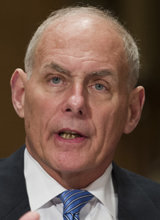Former White House Chief of Staff reveals Trump’s security stance
Former White House Chief of Staff reveals Trump’s security stance
Posted February. 14, 2024 07:53,
Updated February. 14, 2024 07:53

According to a disclosure by former White House Chief of Staff John Kelly, former U.S. President Donald Trump reportedly expressed opposition to the presence of American troops in South Korea during his tenure. The revelation is expected to stir a severe backlash as it reflects the former U.S. president’s stance that demands more defense spending from NATO allies and downplays the importance of security pledges on its allies, including South Korea and Japan.
According to CNN on Monday (local time), Kelly revealed that Trump adamantly opposed the presence of U.S. troops in Korea, stating in an interview published in an upcoming book by CNN security correspondent Jim Sciutto, scheduled for release next month, "For the U.S. deterrence, Trump was 'dead set' against U.S. troops stationed in Korea, as well as in Japan.”
Kelly further disclosed that Trump considered North Korean leader Kim Jong Un and Russian President Vladimir Putin as "okay guys." "He (Trump) felt that the U.S. had pushed North Korea into a corner and seemed to be pushing them (Kim Jong Un and Putin) to the point where they couldn't cope," Kelly said. This implies that Trump believes the presence of U.S. troops in South Korea and joint military exercises between Seoul and Washington were perceived as provocation towards North Korea. Indeed, former President Trump announced during the first U.S.-North Korea summit held in Singapore in June 2018 his intention to halt joint military exercises with South Korea.
"Regardless of the outcome of the U.S. presidential election in November, South Korea and Japan will play a more proactive role on the global stage," Sung Kim, former U.S. Special Representative for North Korea, said at a forum hosted by the Center for Strategic and International Studies. "It is natural for the three countries, the U.S., South Korea, and Japan, to jointly shoulder more costs and respond to more challenges."





![“한동훈, 정치생명 걸고 무소속 출마해 평가받는 것 고려할만”[정치를 부탁해]](https://dimg.donga.com/c/138/175/90/1/wps/NEWS/IMAGE/2026/01/19/133186982.1.jpg)

